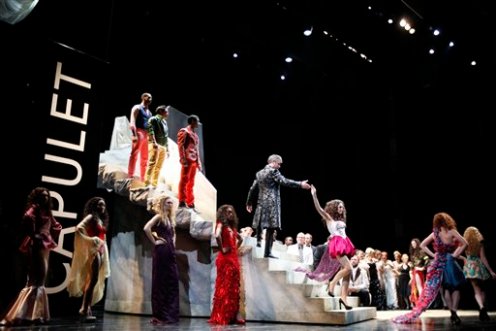Philadelphia opera audiences: too polite to boo a Eurotrash director
While in Philadelphia for a conference last February, I decided to go to the opera. As a young man, I lived in West Philly for 2 years, and while I saw plenty of orchestra concerts in the Academy of Music, I had never seen an opera production there.
It was opening night for the Philadelphia Opera Company’s staging of Roméo et Juliette by Gounod. I was surprised to see so many empty seats (I sat in the Balcony Circle). I eventually realized that all those empty seats—small circles of unoccupied chairs dotting the entire level, from left to center to right—were due to the view-obstructing columns that support the next level. Anyone unfortunate enough to purchase one of these seats would spend the entire evening stretching to the left or right to see what the hell was occurring on stage. I sat in the center of the section, next to one those empty seats, and extreme stage left was blotted out for the entire show. The empty seat made a convenient coat rack.
The director, Manfred Schweigkofler (I believe his last name in English translates as “head like Swiss cheese”), was considerate enough to block the singers towards the center, so the column was never in my way.
Perhaps I would have been better off seated behind one of those posts. Then I would not have had to look at the stupid updating of Roméo et Juliette, or Romeo & Juliet, as POC translated it. The Capulets and the Montagues, you see, were rival designer firms in Verona. Juliet was the superstar model of the Capulets. Romeo was—well, I don’t know what the hell he was supposed to be. Maybe a junior account executive?
Had Schweigkofler really thought through the implications of updating R&J as star-crossed employees of rival corporations, he might have created an interesting evening. Unfortunately, his reconception was the typical half-assed Regietheater practiced by American opera companies: get an abstract set that you can twirl around to become different locations, throw in a few modern references (Friar Tuck gives Juliet her potion in a martini glass; Juliet is on the cover of magazines; paparazzi rush forward to snap photos of Juliet’s fresh corpse), and, Presto! Look everybody! We’re modern, we’re hip, we’re sick!
Unfortunately, these Eurotrash touches provoked more giggles than nods of intellectual approval. Pity, because the production was well sung by young singers who actually looked their parts. The orchestra sounded good, and the chorus work excellent. Another American operatic feast for the ears ruined by the directorial equivalent of Moe Howard poking his index and middle fingers into one’s eyes.
I was impressed by how, well, polite Philadelphians were in the opera hall. Flyers, Eagles, and Phillies fans make their feelings clearly and loudly known, so I was surprised at how reserved their opera-going geographical brethren were. Unlike every other opera audience, Philadelphians didn’t applaud as soon as the soprano or tenor cut their notes off. Wow. We actually got to hear the music that the composer wrote after the tenor’s high B-flat. That was nice.
I waited until the final curtain call just so I could boo the director when he came out, and I did so heartily. It’s an American tradition—boo the director and designers of a bad Regietheater production on opening night. I was the only person in the hall that booed. That earned the respect and admiration of people seated around me, who smiled at me in approval. One of them even applauded me, saying, “Bravo for you!” Sweet. Now I can brag that I got a “bravo” at the Academy of Music.


Here’s another bravo for you, this from a seventy-two year opera lover (I started at the age of four). I don’t object to creative interpretations; some operas invite this. Baroque opera subjects at the time of their composition, for example, were merely an excuse for elaborate singing and awesome stage effects. Take a look at David McVicar’s extraordinary take on Handel’s Julius Caesar — and the included documentary “Entertainment is not a dirty word”: a terrific resetting! Wagner’s Ring also lends itself fairly well to this, but has also been greatly abused. Verdi, on the other hand, is very specific in most of his operas, although I once saw a Trovatore updated subtly in costume to the Spanish Civil War — much more sensible than medieval tights on the men.
But updating Romeo and Juliet? Already done, and much more successfully, by Leonard Bernstein.
Bravo for you and shame on others for not calling out the scam done on them by the stage director. I have no interest in going to see an opera until the last of this Eurotrash con artists is kicked out of the theatre